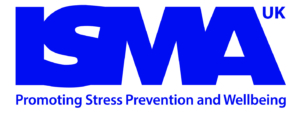Blog: calls for action are greatly needed
 By Carole Spiers FISMA, FPSA, MIHPE, Chair, ISMA (UK)
By Carole Spiers FISMA, FPSA, MIHPE, Chair, ISMA (UK)
International Stress Awareness Week, 7-11 November 2002
I was pleased to see that the World Health Organization (WHO) and the International Labour Organization (ILO) have called for new measures to tackle mental health issues at work in a joint press release issued at the end of September, marking the publication of the WHO guidelines on mental health at work and a derivative WHO/ILO policy brief.
These calls for action are greatly needed. There can be nothing more important than creating a healthy workplace culture, where people feel safe in speaking up and speaking out about stress and mental health issues.
Companies need to focus on building a healthy workplace culture, adjusting to the new international world of work. People need to bring their whole selves to work and shouldn’t feel they can’t talk about personal problems. They also need to leave work feeling psychologically healthy, especially in the current environment where there are additional pressures, with the cost-of-living crisis affecting so many people.
The Health & Safety Executive (HSE), in their work-related stress, anxiety or depression statistics in Great Britain, 2021 state that stress, depression or anxiety accounted for 50% of all work-related ill health cases in 2020/21 – the Labour Force Survey (LFS) reported that 822,000 workers were suffering from work-related stress, depression or anxiety (new or long-standing) in 2020/21. This was higher than the 2018/19 pre-coronavirus levels.
Numbers can sometimes go over our heads, but it’s important to remember that each number represents a person. That should get us to view the numbers with a keener interest.
Managers hold the key to improving this situation – they are the ones at the coalface and so they should be trained to pick up the signs and symptoms of stress early. They shouldn’t leave it until people are experiencing burn-out. If employees do experience burn-out, the chances are that they won’t get back to full-time working again. And if they do return to work, they may be unproductive or under-perform.
This state of affairs affects everyone’s bottom line – unnecessarily, as it can be prevented. Managers need to have EQ skills in their toolbox alongside IQ skills, as they are of equal importance. Not all managers know how to listen or are natural listeners, so they should be trained to allocate quality time and really listen to what their employees are saying – not just listen with one ear. They should have the confidence to ask, “How are you?”, and then wait long enough to get an answer. Too many managers are concerned that, if they ask the question, they might actually be told the truth – and if they are told, they won’t know what to do.
There are dual responsibilities for managing stress at work. Employers need to know what support systems are in place in the organisation to manage onward referral. These could include facilities such as mental health first aiders, first contact listening teams, and EAPs. Both managers and HR personnel need to be trained so that they understand the importance of active listening, and how to keep the conversation with the affected employee open.
At the same time, employees need to feel reassured that they can speak up – it should not be seen as a sign of weakness.
More about Carole
Carole is an international motivational speaker and C-Suite executive consultant. Her credibility is rooted in 25 years’ success as CEO of Carole Spiers Group, a leading UK stress management consultancy, working both in the UK and the Gulf. She is a well-respected authority on reducing stress, building resilience and improving health and wellbeing. Carole is also a BBC guest broadcaster and the bestselling author of Show Stress Who’s Boss! who is regularly called upon by the media for comment. Carole is Chair of the International Stress Management AssociationUK and Founder of International Stress Awareness Week. She is also a Fellow and Past President of the London Chapter of the Professional Speaking Association.
About ISMA UK
The International Stress Management Association (ISMAUK) is the leading professional association for both personal and workplace stress management and has been supporting mental health, wellbeing and performance for over 30 years. A registered charity, we are dedicated to promoting knowledge and best practice in stress management. ISMAUK sets professional standards for the benefit of both individuals and organisations using the services of its multi-disciplinary professional membership.













